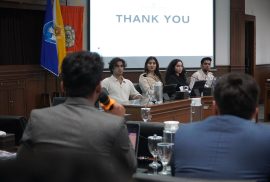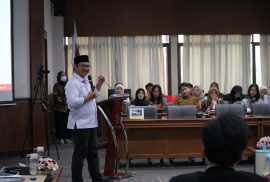
The Executive Series returned to the Master of Business Administration Faculty of Economics and Business, Universitas Gadjah Mada (MBA FEB UGM) on Wednesday, August 13, 2025, at the Sukadji Ranuwihardjo Auditorium. Carrying the theme “Family Business, Tradition, and Innovation”, the event featured prominent speakers, including Jayanti Sari Sulaiman (President Director of Hasnur Group), Shanti L. Poesposoetjipto (President Commissioner of Samudera Indonesia), Prof. Renato Pereira (ISCTE Business School, Portugal), Rocky Adiguna, Ph.D. (THRIVE Lead Researcher, FEB UGM), and Prof. Nurul Indarti, Ph.D. (Head of Management Department, FEB UGM). The session was moderated by Rico Saktiawan J. J., Ph.D. from the Entrepreneurship Research Group, FEB UGM.
In his opening remarks, Rico expressed appreciation for the collaboration among various parties. “We are committed to continuing to provide a platform for dialogue between academics, practitioners, and students to discuss strategic issues that impact the business and entrepreneurship landscape, particularly in the context of family businesses,” he stated.
Vice Dean for Research, Community Service, Cooperation, and Alumni Affairs, FEB UGM, Gumilang Aryo Sahadewo, S.E., M.A., Ph.D., emphasized the importance of family businesses in the national entrepreneurship ecosystem. “Family businesses will be one of the key foundations in developing future entrepreneurship. Currently, the share of entrepreneurs in Indonesia is around 3 percent, lower than countries like Singapore, Thailand, and Vietnam. The challenge lies in how family businesses, typically led by the first or second generation, can ensure a smooth leadership transition to remain sustainable.”
Prof. Renato Pereira explained that in Europe, most family businesses remain small to medium-sized throughout their operations, although some grow into multinational corporations or global conglomerates.
The discussion continued with Prof. Nurul Indarti and Rocky Adiguna, who presented the concept of familiness a unique, intangible resource that is difficult for competitors to replicate, encompassing human capital, cultural capital, and social capital. They noted that not all family businesses are innovation-oriented; some stand out precisely because of their ability to preserve the values of the past.
As second-generation leaders of family businesses, Jayanti and Shanti underscored the importance of striking a balance between preserving tradition and embracing innovation to ensure relevance across generations.
The Executive Series is expected to provide participants with insights and inspiration to develop family businesses sustainably, innovate effectively, and maintain the unique identity of their enterprises.
Reporter: Raina Satmika
Editor: Ayu Aprilia




